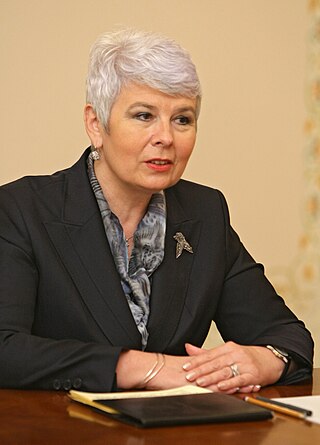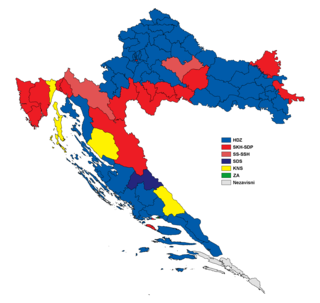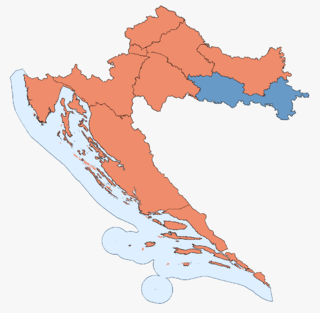Croatian Independent Democrats (Croatian : Hrvatski nezavisni demokrati or HND) was a political party in Croatia.
Croatian Independent Democrats (Croatian : Hrvatski nezavisni demokrati or HND) was a political party in Croatia.
Its founders were members of the moderate faction within the Croatian Democratic Union. In 1993, their unofficial leader Josip Manolić, former protégé of President Franjo Tuđman, had been demoted and was becoming increasingly marginalized, while Gojko Šušak, the powerful defense minister and leader of the hardline nationalist faction, was winning Tuđman's favour. Following the rift between the two, Tuđman, in the Spring of 1994, tried to replace Manolić from the position of speaker. Manolić, however, preempted this by convincing a number of HDZ representatives, along with the opposition parties, to support him . Soon, he was joined by the speaker Stjepan Mesić and two of them announced a split from HDZ and the formation of a new party. They accused Tuđman of embracing authoritarianism, extreme nationalism and irredentist policies towards Bosnia and Herzegovina, which was, in their mind, a betrayal of the founding principles of HDZ. From that point onward, HND tried to describe itself as the "genuine" HDZ.
For a while, it looked that HDZ would ultimately lose parliamentary majority, but Tuđman, in the end, managed to keep number of the moderates in line, thus maintaining and later solidifying his grip on power. HND nevertheless managed to replace HDZ governments on local levels, most notably in Zagreb County, an event that would eventually lead to the Zagreb Crisis.
In the 1995 parliamentary elections, it became apparent that HND didn't attract many of HDZ voters, while those already opposed to Tuđman overwhelmingly preferred the established opposition parties. As a result, HND failed to enter the Sabor. This led Mesić to leave the party and join the Croatian People's Party, while Manolić began to try mending ties with HDZ. As a result, HND became marginalized and ceased to exist.

Franjo Tuđman was a Croatian politician and historian who became the first president of Croatia, from 1990 until his death. He served following the country's independence from Yugoslavia. Tuđman also was the ninth and last president of the Presidency of SR Croatia from May to July 1990.
Presidential elections were held in Croatia on 15 June 1997. They were the second presidential elections held since independence in 1991. The result was a victory for incumbent president Franjo Tuđman, the leader of the Croatian Democratic Union party (HDZ), who received 61.40% of the vote and was re-elected to a second five-year term. As Tuđman received a majority of the valid votes cast on election day there was no need for a run-off. President Tuđman received a plurality of the votes in 20 of Croatia's 21 counties, while Vlado Gotovac did so in Istria County.

Stjepan "Stipe" Mesić is a Croatian lawyer and politician who served as President of Croatia from 2000 to 2010. Before serving two five-year terms as president, he was prime minister of SR Croatia (1990) after the first multi-party elections, the last president of the Presidency of Yugoslavia (1991) and consequently secretary general of the Non-Aligned Movement (1991), as well as speaker of the Croatian Parliament (1992–1994), a judge in Našice, and mayor of his hometown of Orahovica.

Ivica Račan was a Croatian politician who served as Prime Minister of Croatia from 2000 to 2003, heading two centre-left coalition governments.

The Croatian Democratic Union is a major conservative, centre-right political party in Croatia. It is one of the two major contemporary political parties in Croatia, along with the centre-left Social Democratic Party (SDP). It is currently the largest party in the Sabor with 62 seats. The HDZ governed Croatia from 1990 before the country gained independence from Yugoslavia until 2000 and, in coalition with junior partners, from 2003 to 2011, and since 2016. The party is a member of the European People's Party (EPP). The HDZ's leader, Andrej Plenković, is the current Prime Minister of Croatia, having taken office following the 2016 parliamentary election.

This is the history of Croatia since the end of the Croatian War of Independence.

Mate Granić is a Croatian diplomat, politician and physician who served as Minister of Foreign Affairs in the Government of Croatia from 1993 to 2000.

Jadranka Kosor is a Croatian politician and former journalist who served as Prime Minister of Croatia from 2009 to 2011, having taken office following the sudden resignation of her predecessor Ivo Sanader. Kosor was the first and so far only woman to become Prime Minister of Croatia since independence.

Parliamentary elections were held in the Socialist Republic of Croatia between 22 and 23 April 1990; the second round of voting occurred on 6–7 May. These were the first free, multi-party elections held in Croatia since 1938, and the first such elections for the Croatian Parliament since 1913. Voters elected candidates for 356 seats in the tri-cameral parliament; the turnout in the first round ranged between 76.56% and 84.54% for various parliamentary chambers. In the second round, the turnout was 74.82%. The Croatian Democratic Union (HDZ) won 205 seats, ousted the League of Communists of Croatia – Party of Democratic Reform (SKH-SDP) from power and ended 45 years of communist rule in Croatia. The new parliament convened for the first time on 30 May, elected Franjo Tuđman as President of the Croatian Presidency and soon after renamed the office to President of Croatia.

Josip "Joža" Manolić was a Croatian politician and communist revolutionary during World War II in Yugoslavia. He served as a high-ranking official of the Yugoslav State Security Administration and later as Prime Minister of Croatia, from 24 August 1990 to 17 July 1991. He was the last prime minister of Croatia as a constituent republic of Yugoslavia, as the country formally declared its independence during his term, on 25 June 1991. Following his brief term as prime minister, Manolić served as the first Speaker of the Chamber of Counties, the then upper house of the Croatian Parliament, from 1993 until 1994.

Dražen Budiša is a Croatian politician who used to be a leading opposition figure in the 1990s and a two-time presidential candidate. As president of the Croatian Social Liberal Party through the 1990s he remains to date the only Leader of the Opposition not to have been from either the Croatian Democratic Union or the Social Democratic Party.

Parliamentary elections were held in Croatia on 3 January 2000 to elect members of the Chamber of Representatives.

Zdravko Tomac was a Croatian politician.
The Zagreb crisis is the political crisis that followed the elections for the City of Zagreb local assembly held in October 1995. During the crisis the winning parties were unable to appoint their candidate for the Mayor of Zagreb because President of Croatia Franjo Tuđman refused to provide the formal confirmation of their decision.

Stipe Šuvar was a Croatian politician and sociologist who was regarded to have been one of the most influential communist politicians in the League of Communists of Croatia (SKH) in SR Croatia in the 1980s during Yugoslavia.
On 25 March 1991, the presidents of the Yugoslav federal states SR Croatia and SR Serbia, Franjo Tuđman and Slobodan Milošević, met at the Karađorđevo hunting ground in northwest Serbia. The publicized topic of their discussion was the ongoing Yugoslav crisis. Three days later all the presidents of the six Yugoslav republics met in Split. Although news of the meeting taking place was widely publicized in the Yugoslav media at the time, the meeting was overshadowed by the crisis in progress, that would lead to the breakup of Yugoslavia.

Tomislav Karamarko is a Croatian politician who served as First Deputy Prime Minister of Croatia from January to June 2016. He served in the Cabinet of Jadranka Kosor as Minister of the Interior from 2008 to 2011.
The Herzegovina lobby or Herzegovinian lobby is a disputed term that emerged in Croatia in the 1990s for the alleged disproportional influence of Croats from the Herzegovina region of Bosnia and Herzegovina on the politics of Croatia. At times it has been described it as a major factor in contemporary Croatian politics and the most powerful lobby in Croatia, it is also viewed as a stereotype, pejorative, and nonexistent.
The Croatian Left has consisted of a broad range of individuals, groups, and political parties who seek egalitarian, economic, social and cultural rights in Croatia. Left-wing ideologies came to Croatia in the late 19th century during the Austria-Hungary regime. In 1894, the Social Democratic Party of Croatia and Slavonia was formed. It was the first workers party in Croatia at the time. In the Kingdom of Serbs, Croats and Slovenes the leftist movement grew but it was suppressed by the royal government. In 1920, the Communist Party of Yugoslavia was proclaimed illegal and its sympathizers were brutally persecuted after winning a large number of positions in the local elections. During the 1920s, Stjepan Radić and his Croatian Peasant Party led a centre-left agrarianism and anty-royalist policy. They were the leading Croatian political party at the time. After the assassination of Radić in 1929, the Croatian Peasant Party was taken over by Vlatko Maček who enforced a more conservative and nationalist rhetoric. During the Socialist Yugoslavia era, the League of Communists of Yugoslavia was the only legal party in the country. In 1990, political plurality was restored and a number of left-wing parties emerged with the most notable one being the Social Democratic Party of Croatia.